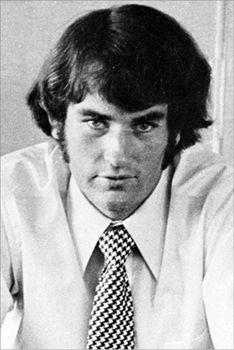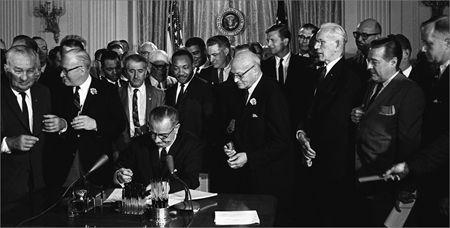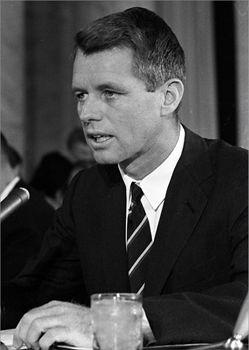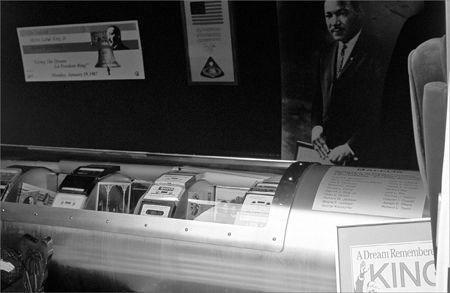Kennedy's Last Days: The Assassination That Defined a Generation (31 page)
Read Kennedy's Last Days: The Assassination That Defined a Generation Online
Authors: Bill O'Reilly

George de Mohrenschildt in 1964.
[© Bettmann/Corbis]
Over the years, my list of personal heroes has developed. I have looked at our country’s history and paid close attention to people who tried to protect the United States and change it for the good and to people who took on huge world problems alone or with little help: Abraham Lincoln, who ended the Civil War and forced the country to stay united; Franklin Roosevelt, who led the country through the Great Depression and World War II; Mother Teresa, who devoted her life to tackling the dire poverty in the slums of Calcutta, India; Bono, who champions the civil rights and social causes of Africans; and Bobby Kennedy, who used the power of his office as U.S. attorney general to further the cause of civil rights.
In 1966, Bobby Kennedy said,
Few will have the greatness to bend history itself; but each of us can work to change a small portion of the events, and in the total of all those acts will be written the history of this generation.… It is from numberless diverse acts of courage and belief that human history is thus shaped. Each time a man stands up for an ideal, or acts to improve the lot of others, or strikes out against injustice, he sends forth a tiny ripple of hope, and crossing each other from a million different centers of energy and daring, those ripples build a current that can sweep down the mightiest walls of oppression and resistance.
He was echoing the meaning of one of John Fitzgerald Kennedy’s favorite quotes. It’s from a poem by Dante, who lived in Italy in the Middle Ages: “The hottest places in Hell are reserved for those who in time of moral crisis preserve their neutrality.”
Today, I take those words to heart. If I see injustice, I say something. As you think about John Fitzgerald Kennedy, I hope that you will appreciate the ways in which he tried to bend history. He was president for only 1,036 days. Who knows what he might have accomplished if he had lived? His death filled the country with sorrow because he represented a grand American vision of pride, fairness, and service to one’s country.

The author as a first-year teacher in Miami.
AFTERWORD
J
OHN
K
ENNEDY’S BURIAL SITE
at Arlington Cemetery is lit by an eternal flame, suggested by Jackie Kennedy. It burns at the center of a five-foot circular slab of Cape Cod granite. Jackie rests next to him, as do their two deceased infants, Arabella and Patrick. Television coverage of John Kennedy’s funeral transformed Arlington from the burial place of soldiers and sailors into a popular tourist destination. To this day, no place in Arlington has more visitors than the grave of John Fitzgerald Kennedy. Generations after his assassination, more than four million people a year arrive to pay their respects to the fallen president.
Jackie Kennedy’s
enormous grief, and the grace with which she handled herself after the assassination, only enhanced the public admiration she earned during her husband’s presidency. In 1968, she married Aristotle Onassis, a Greek businessman. Sadly, the 69-year-old Onassis died of respiratory failure just seven years after their marriage, making Jackie a widow for the second time at the young age of 46. After Onassis’s death, Jackie retreated from the public eye, eventually becoming a book editor in New York City and editing the books of people as diverse as singers Michael Jackson and Carly Simon, and Egyptian novelist Naguib Mahfouz, a Nobel laureate. She died on May 19, 1994, from non-Hodgkin’s lymphoma at the age of 64. She is buried at Arlington National Cemetery next to John Kennedy.
Caroline Kennedy
grew up to attend Radcliffe College and later earn her law degree from Columbia University. She married author and designer Edwin Schlossberg, whom she met while she was working at the Metropolitan Museum of Art in New York City. They have three children. Ms. Kennedy is an author and speaker and volunteers her time to charitable organizations.

The Kennedy grave site in Arlington National Cemetery.
[LOC, DIG-highsm-18141]
John F. Kennedy Jr
. became a symbol for the tragic history of the Kennedy family. The image of him on his third birthday saluting his father’s coffin broke hearts worldwide. Erroneously thought to be nicknamed “John-John”—that name was fabricated by the press—John Jr. attended college at Brown University and then went on to the New York University School of Law and worked in the Manhattan district attorney’s office. On July 16, 1999, he was piloting a small plane when it crashed into the Atlantic Ocean off the coast of Martha’s Vineyard. The accident killed John Kennedy Jr.; his wife, Carolyn Bessette-Kennedy; and her sister, Lauren. He was 38 years old. His ashes, and those of his wife, were scattered at sea.

President Johnson signs the Civil Rights Act into law on July 2, 1964. Martin Luther King Jr. and others witness this historic moment.
[LBJ Library]
Lyndon Baines Johnson
inherited a great deal of unfinished business from the Kennedy administration. He masterfully cobbled together coalitions within Congress to help pass the historic Civil Rights Act of 1964. Johnson, working closely with Martin Luther King Jr., framed the issue in terms of JFK’s legacy in order to gather support for the act. However, Vietnam was an inherited headache that proved to be his undoing. As the antiwar movement gained traction, LBJ, fearing defeat, chose not to run again in 1968. Upon leaving Washington, he returned to his Texas ranch, where he died of a heart attack at the age of 64 on January 22, 1973.
Bobby Kennedy
was devastated by his brother’s assassination. He continued in his role as U.S. attorney general for nine months and then decided to run for the U.S. Senate. He was elected and served for four years. Then, in 1968, he launched a bid for the presidency. On the night he won a major victory in the California primary, he gave a brief speech at the Ambassador Hotel. Just past midnight on June 5, 1968, Bobby Kennedy was assassinated by a disturbed lone gunman, Sirhan Sirhan. Kennedy lived for 26 hours before dying on June 6, 1968, at the age of 42.

Robert F. Kennedy, September 25, 1963.
[LOC, DIG-ds-00976]
Jack Ruby
, whose real name was Jacob Rubinstein, argued that he shot Lee Harvey Oswald to redeem the city of Dallas for the assassination. At trial, he was convicted of murder with malice and sentenced to death. He was eventually awarded a new trial after a judge agreed that Ruby could not have received a fair trial in Dallas, due to the enormous publicity surrounding the shooting. But before the new trial could get under way, Ruby was admitted to Parkland Hospital for symptoms of the flu. Instead, he was found to have cancer in his liver, lungs, and brain. He died of a pulmonary embolism on January 3, 1967, at the age of 55. Jack Ruby is buried next to his parents in Westlawn Cemetery, in Norridge, Illinois.
Martin Luther King Jr.
continued his civil rights crusade and became one of the world’s most admired men. He was named
Time
magazine’s Man of the Year in 1963. On December 10 of that year, he was awarded the Nobel Peace Prize. On April 4, 1968, King was shot down in Memphis, Tennessee, by an assassin named James Earl Ray, a racist who escaped to Canada, and then to England, before being arrested for the murder of Dr. King. On November 2, 1986, a national holiday was declared in King’s honor.
The Oswald family
history is complicated and not always clear. Lee Harvey’s father, Robert E. Lee Oswald, died before Lee was born. He served in World War I and is buried in New Orleans. He was Lee’s mother’s second husband.
Lee
did not have a father figure in his life. He and his mother moved 21 times before he joined the Marines at age 17. In her testimony before the Warren Commission, Marguerite Oswald said her son read a lot and liked to keep score watching football games on TV. She does not mention that school officials thought he might have a personality disorder.
Marguerite Oswald
spent the years after the assassination attempting to convince people that Lee Harvey Oswald was innocent. She lectured to groups and even made a recording reading the letters Lee sent to her from Russia. She died in 1981 at the age of 73.

A time capsule honoring Martin Luther King Jr. was buried under Freedom Plaza at 14th Street and Pennsylvania Avenue in Washington, D.C. It will be opened in 2088.
[LOC, highsm-14536]
Marina Prusakova Oswald
was whisked away to a hotel right after Oswald was shot. There, the FBI interviewed her for hours. A few months later, she testified before the Warren Commission. Marina remarried in 1965 and became a U.S. citizen in 1989. She has appeared in several documentaries about Lee Harvey Oswald and the assassination.